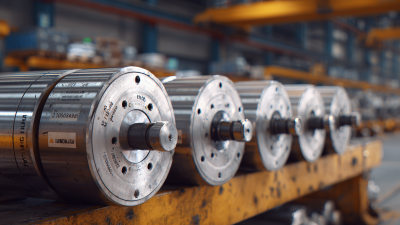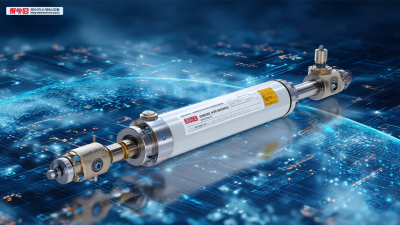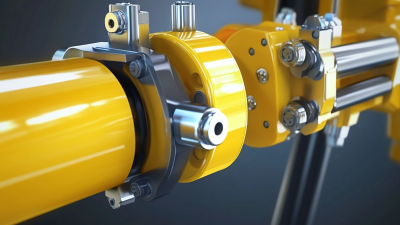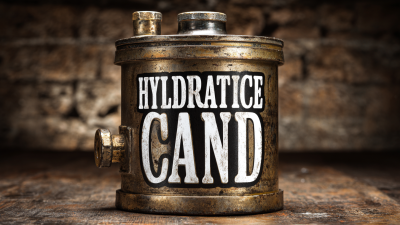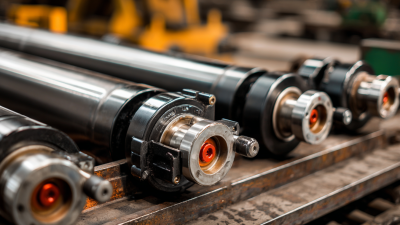In today's rapidly evolving industrial landscape, the demand for high-quality industrial cylinders has seen a significant rise, with market research indicating a projected growth rate of 4.5% annually through 2028. This trend is fueled by the increasing need for efficient power generation and hydraulic applications across various sectors, including manufacturing and construction.
 As businesses strive to enhance operational efficiency and reduce downtime, sourcing reliable industrial cylinders becomes paramount. The right cylinders not only improve system performance but also ensure safety and durability in challenging environments.
As businesses strive to enhance operational efficiency and reduce downtime, sourcing reliable industrial cylinders becomes paramount. The right cylinders not only improve system performance but also ensure safety and durability in challenging environments.
In this ultimate guide, we will explore key considerations and strategies for sourcing industrial cylinders that meet your specific business needs while adhering to industry standards and regulations.
High-quality industrial cylinders are essential for enhancing operational efficiency and safety in various industries. The demand for reliable cylinders, particularly in sectors like liquefied petroleum gas (LPG), is increasing as businesses seek to mitigate risks associated with leaks and failures. According to market research, the LPG valve market is projected to grow significantly, driven by applications in residential and commercial sectors. Specifically, the market is segmented by valve types such as safety valves and regulating valves, highlighting the necessity for high-quality components that ensure proper functioning and safety in demanding environments.
Moreover, the materials used in manufacturing these cylinders play a pivotal role in their performance and durability. Reports indicate a preference for materials like brass and aluminum, which offer both strength and lightweight characteristics, contributing to effective and safe operations. For instance, cylinders weighing less than 4 kg are particularly favored in households and cafes, where ease of handling is vital. As businesses increasingly recognize the correlation between quality equipment and operational efficacy, sourcing high-quality industrial cylinders becomes a strategic priority to enhance productivity and mitigate risks in everyday operations.
| Dimension | Material | Pressure Rating (psi) | Manufacturer Location | Warranty Period |
|---|---|---|---|---|
| 4" x 8" | Steel | 2000 | USA | 1 Year |
| 6" x 12" | Aluminum | 3000 | Germany | 2 Years |
| 3" x 6" | Stainless Steel | 2500 | China | 3 Years |
| 5" x 10" | Carbon Steel | 1500 | India | 18 Months |
| 8" x 16" | PVC | 1000 | Brazil | 1 Year |
When sourcing high-quality industrial cylinders for your business needs, several key factors should be at the forefront of your decision-making process. First, consider the material and construction of the cylinders. Opting for cylinders made from durable materials like stainless steel or high-grade aluminum can enhance longevity and performance, particularly in demanding environments. Ensure that the manufacturing process adheres to industry standards to guarantee the reliability of the cylinders.
Another crucial factor is the compatibility of the cylinders with your existing systems. It is essential to assess the specifications, such as size and pressure ratings, to ensure they meet your operational requirements. This brings us to our first tip: always consult with a knowledgeable supplier who can provide insights into the best-fit options for your specific applications.
Moreover, pricing and delivery time are pivotal components to evaluate. While it's tempting to go for the lowest price, consider the long-term implications of quality. A marginal increase in initial cost can result in reduced downtime and maintenance expenses over time. Tip two: prioritize suppliers with a strong reputation for quality assurance and customer service, as they can often provide better value and support throughout your purchasing experience.

Industrial cylinders are essential components across various sectors, offering unique functionalities to meet diverse operational needs. When comparing the types of industrial cylinders, one of the most common distinctions is between hydraulic and pneumatic cylinders.
 Hydraulic cylinders utilize fluid pressure to generate force, making them ideal for heavy-duty applications such as construction and manufacturing. They offer high power density, which allows them to lift and move substantial loads with precision. In contrast, pneumatic cylinders rely on compressed air, making them suitable for applications that require rapid movement and lighter loads, such as in assembly lines or packaging machinery.
Hydraulic cylinders utilize fluid pressure to generate force, making them ideal for heavy-duty applications such as construction and manufacturing. They offer high power density, which allows them to lift and move substantial loads with precision. In contrast, pneumatic cylinders rely on compressed air, making them suitable for applications that require rapid movement and lighter loads, such as in assembly lines or packaging machinery.
Another important category to consider is the difference between standard and custom cylinders. Standard cylinders are readily available and designed for general applications, whereas custom cylinders can be engineered to fit specific needs, such as unique dimensions or specialized operational capabilities. Industries like aerospace and automotive often require tailored solutions to achieve optimum performance. Additionally, selecting the right materials and seal types can significantly affect the longevity and performance of these cylinders, making informed sourcing decisions crucial for businesses aiming to enhance efficiency and boost productivity.
When sourcing high-quality industrial cylinders, evaluating suppliers is critical to ensure the products meet your business needs. The reliability of a supplier can significantly impact operational efficiency and safety standards. Start by examining the supplier’s reputation through customer reviews and industry recommendations. A reputable supplier will have a track record of delivering consistent quality, which is vital for your business to maintain its standards and avoid costly disruptions.
Another essential aspect is assessing the supplier’s quality control measures. Ask about their manufacturing processes, certifications, and testing procedures. A good supplier will be transparent about their quality assurance protocols and willing to provide documentation. Additionally, ensure they can accommodate your specific requirements, such as custom sizes or materials. Establishing a strong partnership based on open communication and quality assurance can lead to a more reliable supply chain, ultimately benefitting your business in the long run.
When sourcing high-quality industrial cylinders, cost-effectiveness is crucial. Taking into account the latest trends, businesses are increasingly prioritizing cleaner energy sources to meet decarbonization goals. This shift not only reduces energy costs but also aligns with a growing commitment to sustainability. By focusing on energy-efficient industrial cylinders, companies can maximize value while adhering to environmental targets. Using cylinders designed for lower energy consumption can lead to significant long-term savings and a smaller carbon footprint.
Moreover, implementing lean management principles in procurement can enhance purchasing effectiveness. Lean management goes beyond mere cost reduction; it focuses on creating new value through efficient processes. By adopting a lean approach, businesses can streamline their sourcing strategies, minimize waste, and maximize the performance of their industrial cylinder investments. This not only ensures that companies receive high-quality products but also optimizes their overall procurement strategy, helping businesses achieve better outcomes while remaining budget-conscious.
